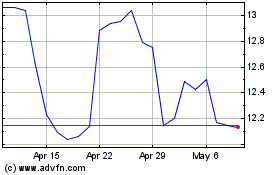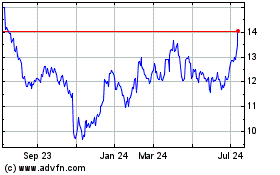Electric Car Makers Lean on China -- WSJ
April 26 2018 - 3:02AM
Dow Jones News
By Trefor Moss and Yoko Kubota
This article is being republished as part of our daily
reproduction of WSJ.com articles that also appeared in the U.S.
print edition of The Wall Street Journal (April 26, 2018).
BEIJING -- Some of the world's biggest auto makers say they will
rely on their Chinese partners to help them meet Beijing's mandates
for electric vehicles, using the joint venture arrangements that
China has now agreed to phase out.
Beijing recently announced that it would gradually end rules
that effectively forced foreign auto makers to form 50-50
partnerships with Chinese companies if they wanted to manufacture
cars here. Foreign auto makers can set up independent companies to
build EVs later this year, according to the new rules.
The action -- following Trump administration claims that the
joint venture rules compromise U.S. auto makers' trade secrets --
has triggered debate over whether foreign auto makers would exit
the JVs and reap more profit, or continue them as necessary to do
business in the world's largest auto market.
When it comes to meeting EV production targets, auto makers
including Ford Motor Co., Toyota Motor Corp. and Volkswagen AG said
on Wednesday at the China Auto Show that they would be leaning on
their Chinese partners to meet the government requirements.
Even with local help, most auto makers said they were scrambling
to build enough EVs in time to satisfy official EV production
mandates, which enter force next year.
All auto makers operating in China must build EVs equivalent to
roughly 3%-4% of their total output in 2019, rising to around 4%-5%
in 2020, according to Beijing's new system, which is designed to
drive electric-car uptake.
Toyota will start producing and selling an EV called the ix4,
based on technology supplied by its JV partner Guangzhou
Automobile, this year, a company spokesman said. A locally produced
plug-in hybrid based on Toyota's own technology is set to hit the
market in 2019.
Even then, the spokesman said, Toyota may need to buy credits
from other auto makers, should it prove unable to hit the official
targets.
Ford is setting up a joint venture with local car maker Zotye
Auto to produce entry-level EVs, but the new company has yet to
receive regulatory approval.
Ford Asia-Pacific President Peter Fleet said the company is
banking on the new joint venture operating in time to help Ford
meet the 2019 production target.
While foreign auto makers can in theory set up solo EV companies
by the end of this year, as the government liberalizes the auto
market, the need to meet production quotas underlines the value of
the joint venture, according to Mr. Fleet.
"It would be arrogant not to suggest there isn't a value from
getting a partner in China," he said, adding that local partners
also bring market insights that foreigners lack. All JV
requirements in the auto sector are due to be lifted by 2022,
according to the recent government announcement.
Volkswagen AG said it would meet the 2019 target thanks in part
to a new battery-powered car developed with its new joint-venture
partner, JAC Motor.
A spokeswoman said General Motors was confident it would meet
the quotas through a combination of Buick and Cadillac plug-in
hybrid models, and the pure-electric Baojun E100, developed with JV
partner SAIC Motor. The E100 went on sale last year.
The Renault-Nissan Alliance said last year it would set up a new
JV with Dongfeng Motor Co. to build EVs.
Most Chinese auto makers are well placed to meet the targets,
but some are struggling -- especially those specializing in
gas-guzzling sport-utility vehicles, such as Great Wall Motor
Co.
Tao Qinghua, Great Wall's general manager for EV sales, said his
company was rushing new models into production to meet the targets,
but conceded that it would be a costly exercise. "It will be rather
difficult to make profits out of EVs before 2020," he said.
--William Boston and Zhu Lin contributed to this article.
Write to Trefor Moss at Trefor.Moss@wsj.com and Yoko Kubota at
yoko.kubota@wsj.com
(END) Dow Jones Newswires
April 26, 2018 02:47 ET (06:47 GMT)
Copyright (c) 2018 Dow Jones & Company, Inc.
Ford Motor (NYSE:F)
Historical Stock Chart
From Aug 2024 to Sep 2024

Ford Motor (NYSE:F)
Historical Stock Chart
From Sep 2023 to Sep 2024
